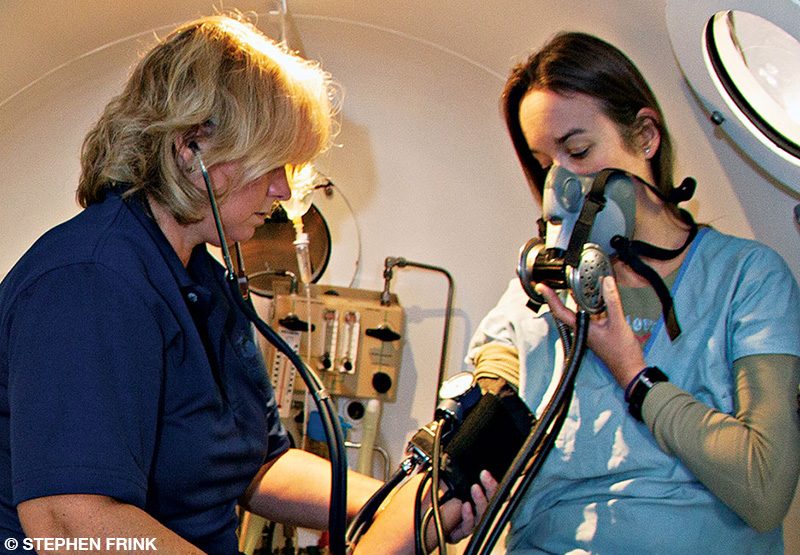The diver is a 60-year-old female with more than 40 years of diving experience, including many years working as a dive professional. She is reportedly in good medical and physical health and takes no regular medications.
The Dives
The diver made a total of 10 dives over a five-day period. On the fourth day of diving she participated in a single planned-decompression dive; all other dives were within her computer’s no-decompression limits. The decompression dive was to 110 feet of seawater (fsw) for 25 minutes, the breathing gas was air, and she met all decompression obligations. There were no reported problems or incidents on that dive.
Within seven hours after the decompression dive she developed numbness and deep pain in her right arm and leg that radiated into her foot. The sensation was unlike any pain she had previously experienced. The next morning she participated in two more dives: the first to 45 fsw for 50 minutes and the second to 30 fsw for 30 minutes. The diver did not recall any changes to her symptoms during or after the dives.
The symptoms worsened during a flight 48 hours after the final two dives. After the diver arrived home, the pain increased enough to wake her from sleep. An anti-inflammatory medication provided some relief, but by morning the pain was radiating into her right shoulder. The grip strength in her right arm seemed to be decreased, and the numbness and pain in her right leg and foot were hampering her ability to walk normally, so she contacted DAN®.
The Evaluation
After gathering all pertinent information, the DAN medic on call strongly recommended that the diver go to the closest emergency department (ED) for evaluation. Believing that her primary care physician could evaluate her sooner, the caller scheduled an appointment with her doctor for the early afternoon. The DAN medic contacted the hyperbaric chamber that would likely treat the patient if she were to be diagnosed with decompression sickness (DCS). The attending hyperbaric physician contacted the diver and asked that she call him while seeing her doctor.

The hyperbaric physician and the patient’s primary care physician worked together to arrive at a likely diagnosis. After performing a full neurological and physical evaluation, the physician diagnosed the diver with neurological (Type 2) DCS. For treatment, she was transferred to the hyperbaric chamber facility, which was two hours away.
On arrival she was reevaluated and treated in the chamber with a U.S. Navy Treatment Table 6, which provided some improvement. Prior to the treatment her arm and leg strength were measured at 3.5 out of 5, but post-treatment her strength was 4.5. The next day she received treatment using a U.S. Navy Treatment Table 5. The only residual symptom after the second treatment was subjective soreness in her right leg. The treating doctor explained that this was common and would resolve with time.
Discussion
This case highlights several things. The first involves symptom recognition. Please remember that pain is your body’s way of telling you that something is wrong — whether you have been diving or not. Not all pain after diving indicates DCS, but any pain should prompt an evaluation. If you have any symptoms that are new to you, seek medical evaluation or contact DAN to discuss your situation.
This diver fortunately experienced a complete recovery despite the five-day delay in treatment after symptom onset. Divers can still receive treatment, however, as long as there is a possibility for positive results. How long a delay is too long to provide treatment is still a matter of discussion among hyperbaric experts. The patient ideally needs to be evaluated and treated as soon as it is practical to do so — certainly within the first 24 hours of symptom onset.
With time, the gas bubbles that cause DCS gradually resolve, but it is not known how long it takes them to completely disappear. It’s clear, however, that once they cause an injury, symptoms may persist longer than the bubbles themselves. If hyperbaric oxygen (HBO) therapy begins within the first 24 hours after symptoms, pressure diminishes the bubbles, and the high partial pressure of oxygen speeds up their elimination. When HBO is delayed for days, it may still be beneficial even though bubbles may not be present; the treatment addresses the remaining tissue injury.
If you experience symptoms, please do not hesitate to seek a medical evaluation. For emergencies, first activate emergency medical services (EMS), and then contact the DAN Emergency Hotline at +1-919-684-9111, 24 hours a day, seven days a week. Your safety is our priority.
© Alert Diver — Q2 2019